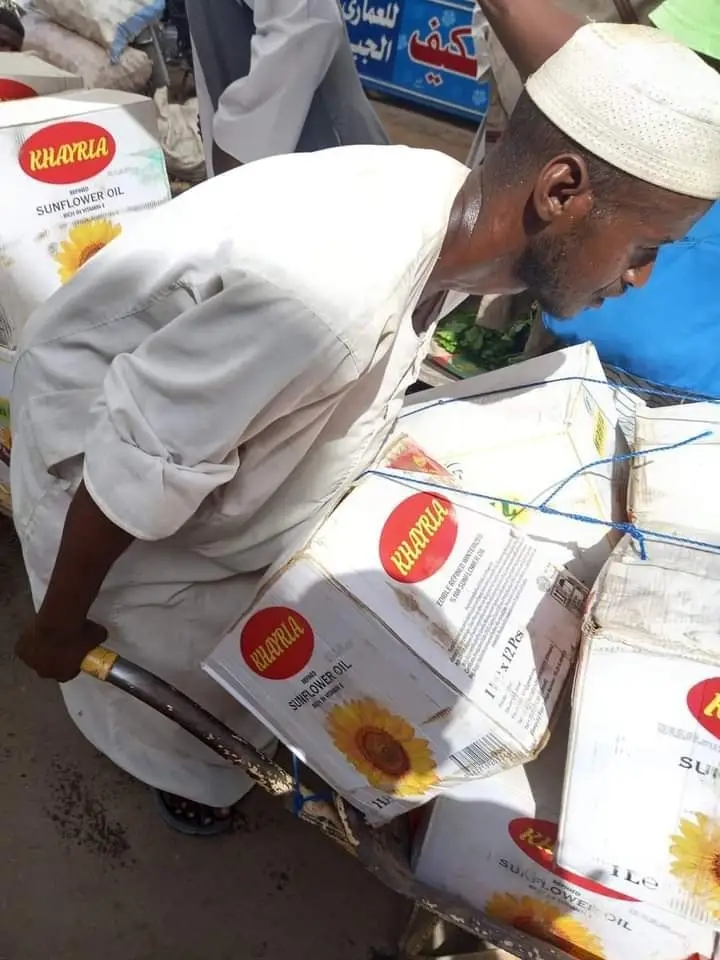As Sudan’s armed conflict between the army and the Rapid Support Forces (RSF) drags on for over 28 months, humanitarian aid from countries and relief organizations has become only a marginal lifeline amid a deepening humanitarian crisis. Thousands of displaced people in camps such as Zamzam and Abu Shouk in Darfur face a double struggle for survival, forcing many to sell portions of their aid packages in exchange for money or medicine.
With the collapse of informal labor markets that once sustained daily life, trading in aid supplies has flourished, to the point that specialized markets—known locally as “Carton Markets”—have emerged, selling food items and medical supplies at prices lower than those in regular shops.
Accounts from both vendors and displaced persons reveal that need often outweighs the intent of aid, while relief agencies deny any organized diversion, asserting that assistance reaches its intended recipients directly.
Interconnected Loops
Relief boxes in Sudan often fail to reach the tables of the hungry, instead taking an alternate route from crowded camps to parallel markets. This network consists of interlinked stages, each participant seeking either survival or profit.
In the camps, where need is most severe, beneficiaries sometimes become the first sellers. “I received my full aid package,” says Samia, a displaced woman from Zamzam. “But I had to sell part of it—like flour and oil—to buy medicine for my son and pay transport fares. When I went to the market, I found the same box being sold in front of me, for less than the price of a bag of vegetables.”
From within aid agencies, Hamed Ayman, a former relief worker in North Darfur, explains: “Once permits are delayed or convoys are looted, the official chain collapses. Some supplies never make it to the camps. I’ve seen warehouses in El Fasher completely looted—and days later, the same goods show up in traders’ shops.”
At the transport stage, the process becomes even more fragile. Abdel Wahab Al-Nour, a truck driver on the Port Sudan–Darfur route, says: “The road is full of checkpoints and middlemen. Any attack or delay leads to emergency sales. Often, goods are divided and sold off from the trucks before they reach their destination, with each party taking its share.”
Finally, the boxes appear in the markets as ordinary goods. Hussein Ashraf, a retailer in Port Sudan, explains: “We receive aid boxes sealed with donor logos and marked ‘Not for Sale,’ but people don’t care anymore because demand is high—they’re cheaper than imported products, and regular buyers don’t ask where they come from.”
The Leakage of Aid
Humanitarian aid in Sudan has ceased to be merely a means of survival; it has become a commodity traded in a shadow market governed by its own rules. Prices fluctuate with supply and demand, enriching many traders while leaving the poorest still at a loss.
Tayeb Abdel Rahman, a wholesaler in Omdurman, says: “I buy an aid box from a displaced person for about 20 dollars and sell it for up to 40. There’s strong demand because people see it as cheaper than normal goods.”
He continues: “This market has become a parallel economy operating beyond oversight. Middlemen collect boxes from beneficiaries in the camps, and through complex networks, they reach us. For me, it’s profitable—but in reality, this aid was meant for the destitute.”
He admits: “The existence of this trade puts pressure on the economy. Consumers prefer buying aid boxes since they’re cheaper than commercial goods, which lowers demand for local products. We traders profit, but the state loses—and the truly needy remain unprotected.”
Struggling to Survive
Behind the “carton trade” lie heart-wrenching stories of families forced to sell what was meant to save them from hunger. Aid has turned into a currency of survival in wartime.
Rihab Ahmed, a displaced woman from Khartoum now living in Port Sudan, recounts: “When I first received an aid box, I felt relief—but it wasn’t enough to feed my family. I sold half of it to buy vegetables and firewood. Two days later, when my little daughter got sick, I sold the rest to buy her medicine. It wasn’t an easy decision, but it was the only way to survive.”
She continues: “Many women here do the same. Some sell the entire box to pay rent or send money to trapped relatives. It’s become normal—no one feels ashamed anymore. People say: ‘You can’t eat aid alone; you need other things to live.’”
With a heavy tone, she adds: “Sometimes I see the same box in the market with the organization’s logo. It hurts, but I understand—the one who sold it is just like me, forced by need. We’re not traders; we’re just trying to survive.”
Monitoring Mechanisms
Despite mounting reports from civil society and independent monitors about aid diversion, the Sudanese government continues to deny any systemic leakage, maintaining that relief aid reaches the rightful beneficiaries.
At the same time, Ibrahim El-Sheikh, a relief officer with an international organization working in Darfur, insists: “Claims about aid leakage are inaccurate. We follow strict monitoring mechanisms from storage to direct distribution to displaced persons. Every shipment is documented and tracked in real time. There’s no room for diversion or black-market sales as alleged.”
